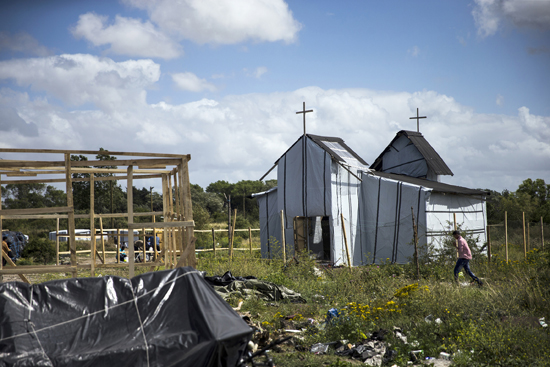Ann Dummett, a Catholic academic and a member of the Joint Council for the Welfare of Immigrants, tellingly entitled one chapter of her 1973 book, A Portrait of English Racism, “What I say three times is true.”
We could be back in the 1970s now, as we hear the rhetoric about the “jungle” in Calais, where a small contingent of around 3,000 refugees has encamped with a desperate determination to find sanctuary in Britain. (This is a minute group among all the refugees who have made it to Europe. According to the UNHCR, Germany has pledged to take 30,000 Syrians, apart from other nationalities – 97,000 according to recent figures – while Italy has rescued 60,000 from the Mediterranean this year.)
 The repeated vilification is deliberate. Call them “marauders” (as Phillip Hammond, Foreign Secretary did on 9 August), or describe them as a “swarm”, as Prime Minister David Cameron did, assumes malicious or subhuman intent, allowing us to treat them either as criminals or pests. Thus before the 1994 Genocide, the Rwandan Government consistently labelled the Tutsi as “cockroaches”, and whipped up murderous hatred with the consequences we know.
The repeated vilification is deliberate. Call them “marauders” (as Phillip Hammond, Foreign Secretary did on 9 August), or describe them as a “swarm”, as Prime Minister David Cameron did, assumes malicious or subhuman intent, allowing us to treat them either as criminals or pests. Thus before the 1994 Genocide, the Rwandan Government consistently labelled the Tutsi as “cockroaches”, and whipped up murderous hatred with the consequences we know.
It is important that this language is challenged. As Ann Dummett observed, without this, we simply absorb the lies and can slip into promoting untruths ourselves. Karolina Maroszek, head of the Haringey Migrant Support Centre, tells me, for instance, that her blood “boils” when she hears clients casually referred to as “illegals”. “How can people be ‘illegal’?” she asked. “They can do illegal things in order to survive, but they are human beings in a desperate plight”.
And Thierry Cuenot, head of emergency services for Secours Catholique – Caritas France, issued a press statement describing the Calais camp as a humanitarian crisis equivalent to that of a war zone.
We at Westminster Justice and Peace have signalled that goods such as blankets and cooking utensils are needed in Calais, and parishes around the diocese have already responded with goods collections and offers of help. How comforting that the government rhetoric has fallen on diocesan deaf ears and people are listening instead to the Gospel call to welcome the stranger and visit the imprisoned.
Meanwhile Bishop Pat Lynch, of the Catholic bishops’ conference, expressed deep concern over the crisis, declaring: “Governments, charities and humanitarian aid agencies should be encouraged to work together for a collaborative international response to the challenge in partnership with the countries of origin [who] must recognise that 'the defence of migrants rights' is viable and effective when based on a firm foundation of legal norms, and operates under the rule of law (Caritas Europa 2009)".
This language of rights must prevail. The occupants of the jungle are mainly refugees fleeing persecution, who should be protected under the UN Convention on refugees. Putting millions of pounds into better security is more “illegal” than climbing fences with the hope of surviving.
To see the makeshift church in the Calais camp is a reminder that even, or especially, in their dire situation, refugees are asserting their human dignity, and finding God in their midst.
To send goods click here; to give money click here or here. BBC One’s Songs of Praise, which includes footage from the Calais camp church, airs on Sunday at 5pm.
Barbara Kentish, Westminster diocese Justice and Peace commission
Above: the camp church quietly underlined migrants' humanity. Photo: CNS/EPA


 Loading ...
Loading ...
What do you think?
You can post as a subscriber user ...
User comments (1)
To dehumanise and/or criminalise through language is always the beginning. The 20th century is littered with the most appalling crimes against our humanity which were facilitated in the first instance through linguistic objectification.
Messrs Cameron and Hammond, as ministers of state and servants of the Crown and us, should be setting an example rather than giving legitimacy to a mob mentality. Even today, he talked about not allowing migrants to "break into Britain", more criminal language in every sense.
Our bishops, Anglican and Catholic, as well as other religious leaders should be leading the challenge to the use of such defamatory and objectifying descriptions.